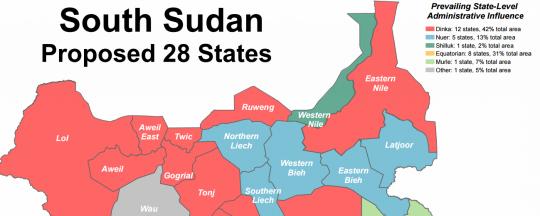Mayol Kur, governor of Ruweng State, said Tuesday his state will continue to operate as an independent state even if the parties to the peace agreement decide to reverse the creation of more administrative units in the country.
President Salva Kiir and his new unity cabinet were scheduled to discuss the 28 states last Friday. Though the meeting has been postponed, the dispute over Establishment Order and the number of states remains one of the most pressing issues facing his administration.
Ruweng State is one of three successor governments to Unity State, which the peace agreement said should be governed by an SPLM-IO governor. Instead, in October 2015 Kiir decreed that the state should be divided and he appointed his own loyalists to head the new administrations.
Mayol Kur is one of them. “For us in Ruweng, the creation of 28 states was not a surprise. It was not the result of the conflict. We think it is a response to the call of our people to be given a separate administration from where our area was administered,” he said.
“It was a call for several years and can never be reversed even if a decision is made today to reverse the creation of 28 states. The existence of Ruweng as a state will not be one of them. It will continue to operate as an independent state from the rest,” argued Governor Kur when asked on Tuesday about what he thinks of the fate of Ruweng in the light of the January IGAD communique.
East African bloc IGAD has called on South Sudan not to implement the creation of 28 states, saying it is not in spirit with the peace deal.
Mayol said the area was prepared to generate resources of their own to fund their activities, asserting that people from the area who have been demanding the creation were aware of their obligations.
“We have heard people talking about whether these new states will be sustained or not. They are talking about lack of resources. Yes, there are challenges and we know them. Our people know their obligations and so the issue of resources will not make them change their minds from having state of their own, which has been their demand. They will run it with whatever they have,” he explained.




